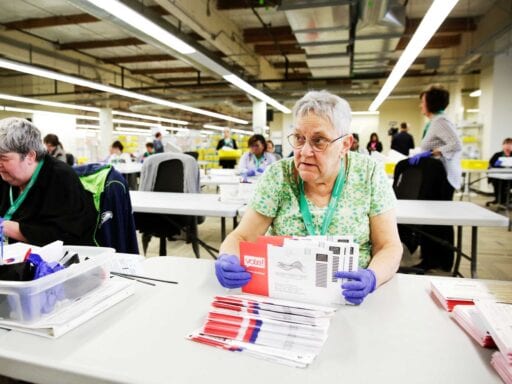If voting in person during coronavirus is too risky, one senator’s solution is for states to vote by mail.
Lawmakers have a plan to make sure voting in the 2020 presidential primary and general election doesn’t mean risking Covid-19.
Sen. Ron Wyden (D-OR) introduced a bill Wednesday mandating states set up emergency vote-by-mail systems and providing $500 million in federal money to help them get their election systems responsive to the worsening Covid-19 crisis. Wyden is working with multiple bill co-sponsors in the House, but the timing of when either chamber may vote on the bill is currently up in the air.
“No voter should have to choose between exercising their constitutional right and putting their health at risk,” Wyden said in a statement. “When disaster strikes, the safest route for seniors, individuals with compromised immune systems or other at-risk populations is to provide every voter with a paper ballot they can return by mail or drop-off site.”
Republicans have historically been opposed to measures that expand voting access, but Wyden said he hopes the impending coronavirus crisis will spur bipartisan action on the issue, especially ahead of the general election in November.
“This is a nonpartisan, commonsense solution to the very real threat looming this November,” the Oregon senator said.
The US systems for elections is highly decentralized; each state has the power to run their own elections. Even if the bill is passed, it could hit some legal hurdles if states object to the federal government mandating a vote-by-mail option.
The impacts of the coronavirus are already being felt in the US campaign season. The remaining Democratic candidates — former Vice President Joe Biden and Sen. Bernie Sanders (both in their late 70s) — canceled political rallies in Ohio after citing concerns about the spread of coronavirus. Though a Democratic debate featuring Sanders and Biden is scheduled to continue Sunday, it is being moved from Arizona to Washington, DC, and will happen with no live audience. President Donald Trump has also canceled a scheduled rally in Milwaukee.
But while rallies can easily be canceled or postponed, elections cannot. Four states — Florida, Ohio, Illinois, and Arizona — are set to have primaries on Tuesday. Seven more states and territories have their primaries scheduled between March 24 and April 7.
The bulk of the concern is whether turnout could be dampened because voters are afraid to go to the polls or whether poll workers (the majority of whom are over 61 years old, according to a government report) are afraid to show up. And the greater fear is those who show up risk exposing themselves to coronavirus, especially if they have to wait in line for long periods of time.
Many states allow for absentee ballots and a growing number are adopting vote by mail (including Wyden’s home state of Oregon), but the practice isn’t as easy or widespread as it is in, say, California or Washington. Wyden’s bill aims to change that.
What Wyden’s bill will do
Wyden’s bill, the “Resilient Elections During Quarantines and Natural Disasters Act of 2020,” would require all states to expand mail-in voting systems if and when a critical mass of states declare coronavirus-related states of emergency (or another kind of emergency happens like a massive natural disaster).
Under Wyden’s plan, if 25 percent of US states declare an emergency, that would trigger a requirement to allow any voter to vote from home via a mail-in ballot. Here’s what the bill would require all states to do:
- Offer all registered voters the ability to vote absentee.
- Offer voters the ability to submit an electronic request for an absentee ballot rather than request one in person or with a paper form.
- Offer voters the choice to receive their blank absentee ballots electronically to print at home and return in the mail. Currently, this option is only available to overseas voters and those in the military.
- Accept absentee ballot requests up until five days before an election for blank ballots sent in the mail and up until one day before the election for electronic print-at-home ballots.
- Accept ballots postmarked by Election Day in case there are delays due to postal workers being quarantined.
- Offer prepaid, self-sealing envelopes in order to minimize the possible spread of coronavirus through licking envelopes.
The bill would provide $500 million to states to help them meet those requirements.
There are varying levels of vote-by-mail access in each state. Currently, 34 states and Washington, DC, allow any voter to request an absentee ballot or vote by mail. That leaves a remaining 16 states with restrictions on who can request an absentee ballot.
Here’s a map showing what each state allows, per Daily Kos writer Stephen Wolf.
The #coronavirus could heavily disrupt 2020 election processes. States should prepare now by adopting universal voting-by-mail. This map shows which states vote by mail, allow no-excuse absentee mail voting, or require an excuse to vote absentee #COVID19 https://t.co/xrae3jk1P5 pic.twitter.com/4O67MOItuJ
— Stephen Wolf (@PoliticsWolf) March 10, 2020
Wyden’s bill likely won’t be passed in time for the four states holding primaries next month. But as these states start to prepare for the reality of voting in the middle of a coronavirus epidemic, lawmakers need to prepare for how a disease outbreak can impact Americans’ right to vote.
Author: Ella Nilsen
Read More



